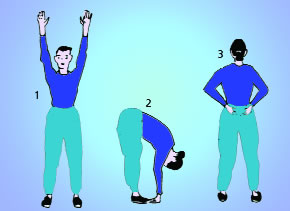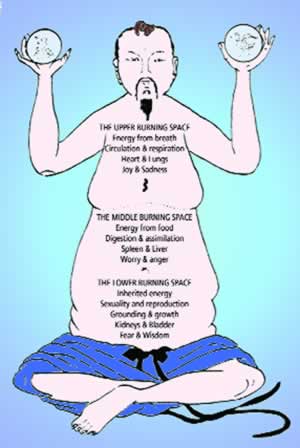Positive Health Online
Your Country

Daoist Diary: Winter
listed in chinese oriental medicine, originally published in issue 95 - January 2004
Retreating Into Hibernation
At this time of year we often wake to cold, dark mornings of frost, sleet or snow. Winter is upon us and we feel an inclination to snuggle under the warmth of that cosy duvet, rather than face getting up and going to work. As far as the Daoists are concerned, to hibernate at this time of year, and thus conserve energy, is to go with the flow – to rush about busily and expend energy is to go against the flow and invites ill health. A duvet day here and there is becoming more acceptable in the workplace, but obviously it is not realistic to expect that we can all retreat into total hibernation! However, it is possible to create a restful time for ourselves in the winter and, by so doing, we can ensure that we build healthy immune systems and ward off colds and flu.
Winter is the season for staying warm and rested, eating hot, cooked food, practising gentle massage and breathing techniques whilst cultivating silence and stillness. In this way we take care of our energy keeping it 'soft and supple' and so find ourselves refreshed when spring arrives. Followers of the Chinese philosophy of the Dao know the importance of guarding against energy expenditure at this season of the Water Element, the time of cold yin energy, and do so by cultivating quietness and contemplation. This is the time of year to give yourself permission for a long lie in and to encourage yourself to go to bed early! Allow yourself to stop focusing so much on outer affairs and make your home the centre of your activities – a place to rest and regenerate. In this way the Daoists say we conserve our precious Kidney energy. The Kidneys are the organs associated with the Water Element and it is crucial that the Kidney energy lies dormant during the winter.
Whilst this seems to be a time of descent into the underworld, a dying to the old way of life that kept us so busy through spring, summer and even autumn, the Daoists also speak of the need to keep our fire alive, burning quietly and steadily in the darkness to remind us of the new life that will be born when spring arrives again.
This then is a good time of year to adopt rituals that bring warmth and light to a peaceful, wintry world – light candles, burn joss sticks and natural oils and so create a sanctuary in your home environment that is relaxing and healing to see you through the winter. By creating a warm, safe space at home you will be able to focus on conserving and resting the energy of the Kidneys, rather than using this energy up by living life in the fast lane.
Keeping Warm
Possibly one of the most valuable things you can do to maintain good energy and immunity levels in the winter, apart from resting regularly, is to keep yourself warm. When we are cold our system contracts – blood and chi do not circulate and we become very quickly fatigued. When we are warm, according to Daoist texts, we help the Kidneys to control the fire of alchemical transmutation in the lower abdomen which allows all energetic transformations. This is often depicted as a cauldron in which the liquid and essence of the Kidney yin is heated by the fire of Kidney yang. Keep this picture in mind, of water and fire creating life, and ensure that your lower abdominal area is very well clothed in the winter – get those thermal long-johns on and practise the following massage and exercise techniques on a daily basis to keep the energy warm and moving in this area.
The acupuncture point in the depression between the second and third lumbar vertebrae is known as the Gate of Life (Ming Men). This is one of the most important points used to treat Kidney energy and thus cultivate strong energy and immunity. Start and end the day by stretching and massaging this entire lower back area to help warm the Gate of Life in the following manner.

Warming: the Gate of Life
• Stand with feet parallel and shoulder width apart. Place your hands over the lower abdomen whilst breathing calmly and steadily;
• Take a deep breath in and stretch on tiptoes with hands above the head. Release and breathe out (Figure 1);
• Standing as before with hands over the abdomen, take a deep breath in and with the out breath let your body flop forward over your legs with your arms, waist and lower back relaxing comfortably. Breathe normally in this position until returning to upright position on inhalation. Take a few breaths and repeat (Figure 2);
• Standing as before with feet parallel and shoulder width apart, breathe deeply with your hands over the lower abdomen;
• Rub your hands together vigorously until warm and then place over the kidneys. Repeat three times. With your warmed palms continue to rub and massage that area gently until warm and tingly (Figure 3);
• Make a loose fist with the hands and very lightly pummel the muscles on either side of the spine.
We can also maintain warmth by ensuring that we eat only warm, cooked foods in the winter. Now is definitely not the time for salads or any raw food but, instead, eat soups and stews, enjoy root vegetables and hot meats, such as lamb and chicken. Chicken is a warm yang food which can be stir-fried with onions and a pinch of cayenne in the winter, or try this simple but delicious recipe which uses warming garlic and ginger to combat the cold:
Chicken with Shiitake Mushrooms.
1 chicken jointed into 6 pieces
1 litre water
Salt and pepper to season
1 dessertspoon olive oil
9 ozs sliced shiitake mushrooms
1 tsp finely chopped ginger
1 clove finely sliced garlic
• Put the chicken carcass into a pot and cover with boiling water. Add seasoning and simmer on a low heat with a tight fitting lid to create a rich stock;
• Once the stock is ready, strain the liquid off and set aside. Place the chicken pieces in a shallow roasting dish in the oven at 400°F/200°C/Gas mark 6 for 30 minutes;
• Meanwhile stir fry the mushrooms in the oil with the garlic and ginger until soft. Add this to the chicken stock;
• Pour the stock and mushrooms over the chicken and return to the oven for 25 minutes;
• Enjoy with croutons and mixed vegetables.
Another ideal yang food for the cold is herring which can be rolled in beaten egg, covered with oatmeal and baked in the oven to create a warm and nourishing winter meal.
Developing Awareness of Inner Power
The Daoists understood that we are born with a vital essence – the oil in the lamp so to speak – and that this essence, known as 'Jing', will diminish as we age. Jing is considered to be a very precious substance – the foundation of our constitutional energy – one that we need to protect and value by ensuring that we do not erode it through excesses, neither by overworking nor by partying!
Jing is stored in the Kidneys and has a very powerful association with other tissue in the human body, particularly influencing our reproductive systems, bone marrow, brain, spinal cord and our nervous and immune systems. During the Winter, time of the Water Element, we need to particularly develop an awareness of Kidney Jing – the inner power of life itself – and ensure that we conserve this precious substance carefully. As all of nature – animal and plant life – rests in the winter, so too must we and in this way we respect and cultivate this inner source of energy that will sustain us throughout our lives. This also means we need to make sure that we are not too sexually active in the winter months. This applies particularly to men for, when they lose semen, they deplete Jing.
Traditionally, to prevent fatigue and immune deficiency, this vital fluid should be stored, not only by having less frequent intercourse but also by prolonging intercourse and deliberately holding back ejaculation. Women, on the other hand, can enjoy orgasm as this is not associated with a loss of fluid and so promotes good health!
By resting and storing the Kidney Jing during the winter we will encourage a sense of strength and resolve that we can draw on in the more active times of our lives. Cultivate a daily awareness of this fundamental substance by practising lower abdominal breathing to nurture Kidney Jing. Focus particularly on the Dan Tian (sea of energy) – the energy centre just below the naval. All the energy in what is known as the 'lower burning space – one of the three centres of energy transformation (see Figure 4) – is associated with the Kidneys and lower abdominal breathing will strengthen this energy. It will also have a calming, balancing and spiritually uplifting influence on this energy field. Light candles and burn oils to create a restful and tranquil environment. Sit comfortably in a chair or lie on your back whilst breathing naturally with relaxed shoulders and jaw.

The three centres of energy transformation
Lower Abdominal Breathing
Inhale slowly through your nose (counting to five) and gently exhale through your mouth (also counting to five). As you inhale, feel a movement all the way down to the Dan Tien – the energy centre just below the naval. Allow your abdomen to expand as your diaphragm moves down in a full breath, then let your abdomen relax as you exhale completely. Breathe continuously, with no pauses between the exhalation and the inhalation. With closed eyes focus attention fully on the Dan Tien. As thoughts arise simply let them go. You may start to feel a warmth in this area and a deep sense of relaxation. Continue focusing and breathing for fifteen minutes or so. If you drift off to sleep as you do this exercise, so much the better. Winter is a time to preserve the deep resources of our being – rest and sleep are essential.
Resources
Reid D. Chi Gung. Simon and Shuster. 1998.
Hill S. Reclaiming the Wisdom of the Body. Constable and Company. 1997.
Teeguarden I. The Joy of Feeling. Japan Publications Inc. 1984.
Ody P. Practical Chinese Medicine. Godsfield Press Ltd. 2000.
Comments:
-
No Article Comments available